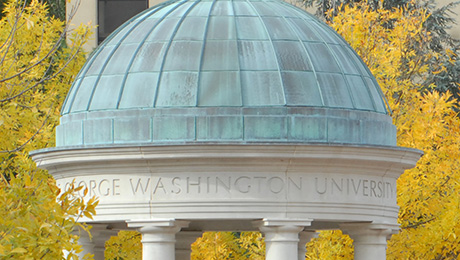The George Washington University will no longer require most undergraduate applicants to submit SAT or ACT test scores, effective Aug. 1.
Those applying to GW for the 2016-17 school year will have the option to include standardized test scores as part of their application. High school coursework and grades will continue to be the most important factors in GW’s holistic review process, along with a student’s writing skills, recommendations, involvement in school and community, and personal qualities and character. However, this year, students who do not think their SAT or ACT scores are an accurate reflection of their academic potential can choose not to submit them.
The decision to adopt a “test-optional” policy was made in response to recommendations from the Access Committee of the university’s Task Force on Access and Success.
Members of the task force have been looking at the value of test scores in understanding how a student performs at GW. Their findings supported the conclusion reached by other universities and studies: One can predict success at GW based upon a student’s high school record, especially his or her high school GPA.
“The test-optional policy should strengthen and diversify an already outstanding applicant pool and will broaden access for those high-achieving students who have historically been underrepresented at selective colleges and universities, including students of color, first-generation students and students from low-income households,” said Laurie Koehler, senior associate provost for enrollment management and co-chair of the access committee. “We hope the test-optional policy sends a message to prospective students that if you are smart, hard-working and have challenged yourself in a demanding high school curriculum, there could be a place for you here.”
Graduate School of Education and Human Development Dean Michael Feuer said, “With the change, GW continues to strive for the twin goals of high academic standards and improved access, so central to the history of American education and especially important now in an era of demographic, economic and educational change.
“I look forward to monitoring this innovation in admissions policy and learning how this will widen the field of qualified applicants and continue to move our university to even higher levels of academic excellence,” said Dr. Feuer, who co-chairs the access committee.
The change in GW’s admissions process also aligns with a growing national trend. Hundreds of colleges throughout the country have opted to become test optional in recent years.
“Although we have long employed a holistic application review process, we had concerns that students who could be successful at GW felt discouraged from applying if their scores were not as strong as their high school performance,” said Dean of Admissions Karen Stroud Felton. “We want outstanding students from all over the world and from all different backgrounds—regardless of their standardized scores—to recognize GW as a place where they can thrive.”
The university’s new admissions policy will include exceptions for homeschooled applicants, students from high schools that only provide narrative evaluation of students, college athletes and students applying for the seven-year B.A./M.D. program. Prospective students with questions are encouraged to contact the Office of Admissions.



